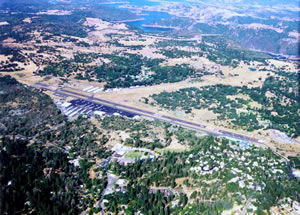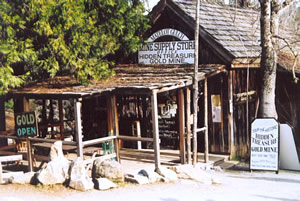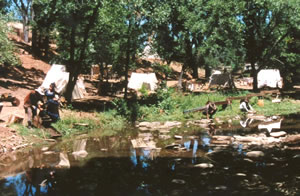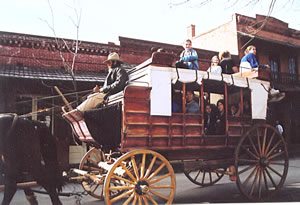|
Learn about Tuolumne County, California, by reading Prospecting the Great Unfenced by Charlie Spence, Travel Writer and WTA Member. It features a mini, but thorough tour of the destination, plus all you'll need to know to plan your trip including getting there, objective information on places to stay and eat, and things to do. At the end of the article, we've provided a summary of the contact information for your easy reference. Enjoy!
Prospecting The Great
Unfenced - Tuolumne County, CA
by Charlie Spence, Travel Writer and WTA Member

Columbia Airport is walking distance from the town.
Lower right, at end of runway is Colombia State Historic Park.
New Melones Lake in the background offers excellent water sports and fine
fishing.
Photo courtesy Tuolumne County Visitors Bureau.
When gold was
discovered at Sutter’s Mill in 1848, it was six months before
Americans reached another gold field in what is now a part of “The
Great Unfenced” area of California. Today, however, you can reach it
in a matter of hours and be a 49er at the historic sites, even swirl
your pan and look for your own shining nuggets in the heart of the
Mother Lode country. Tuolumne
(pronounced ‘Too-all-a-me’) County is in the Sierras and known as the
playground with a heart of gold. This is one of the Golden State’s
original counties, and when you visit it, you will get the feel of
what the gold hunters experienced. Many towns sprang up, wherever
someone found a piece of gold. The towns are still relatively small
and touches of the settlement days remain to transport you back to
those rip-roaring times. What was once called Hildreth’s Diggin’s now
is known as Columbia, an ideal place to start your exploration.

Shop like the 49ers did in this Historic Park Hidden
Treasure Gold Mines Tour
and Matelot Gulch Mines Supply Store.
Photo courtesy Tuolumne County Visitors Bureau. Columbia is the
best preserved gold rush town in the Mother Lode - and for good
reason. By 1980, the Gem of the Southern Mines had produced
more than $1 billion (in today’s money). The town bustles with shops,
exhibits, and lively activities of the 1850s. Throughout the year
special events celebrate the golden years. For instance, the historic
Senora Pass Wagon Train brings to life the Clark-Skidmore wagon train,
which was the first to cross over the Sierra Nevada via Senora Pass.
Its destination is the town of Twain-Harte and arrives during the
town’s Summer Festival. You may go off on
your own to pan in the streams or sign on with one of the local
businesses where you can get assistance from professional gold
prospectors. They offer all the supplies you will need. Go out for a
few hours, for the day, or for extended periods. For example, you
can take a five-hour trip that includes digging, sluicing, and panning
for gold, have a picnic lunch and collect beautiful rocks. The cost is
about $80. Keep all the gold you find but don’t expect the riches that
drew thousands to this area more than 150 years ago.

Jimtown 1849 gold mining camp by Gold Prospecting
Adventures.
Pan for your fortune.
Photo courtesy Tuolumne County Visitors Bureau. This entire area is
called “The Great Unfenced” because it has so much open territory.
Nearly half of Tuolumne County is unsettled. The National Forest, the
Sierra Nevada, and the Emigrant Wilderness occupy a major portion of
the County. Emigrant Wilderness is untouched by any motorized
vehicles. Many motion picture and TV productions - such as Little
House on the Prairie - use Tuolumne County for settings. If mining for gold
isn’t your style, there are still a wide variety of things to do and
see in this unique and historic area. Take a steam-train trip or visit
a railroad roundhouse. Guided tours of the Round House are offered
throughout the year at a 26-acre steam locomotive facility operated by
the California State Railroad Museum. Excursion train rides chug along
on Saturdays and Sundays, April through November. More than half of
the 400 movies that have been made here have used the steam train.

The whole family will enjoy the stagecoach ride.
Photo courtesy Tuolumne County Visitors Bureau. Or, go nautical.
Tuolumne County has great whitewater activities, offering everything
from float boats to Class 5 runs on the Tuolumne River. Cherry Creek
and North Fork on the Stanislaus River offer varying degrees of
whitewater excitement opportunities. Try rafting or kayaking in this
"Great Unfenced" area. For any whitewater activity, it is best to call
a day ahead and make reservations as this popular activity sells out
quickly. You will find excellent fishing in remote mountain streams or
on lakes and reservoirs. Try the waters of Don Pedro, Lake Tulloch, or
New Melones for a 12-pound Bass. Stanislaus National Forest offers 811
miles of rivers and steams with 18 species of fish. For a special
fishing trek, horseback guides to the Emigrant Wilderness are
available. Elevation of Tuolumne County ranges from 300 feet to more
than 10,000, meaning you can golf on one day and snow ski the next. Just down the road
from Columbia you will find Yosemite National Park. About 95 percent
of the park’s 1,169 square miles is wilderness area. Yosemite boasts
nine magnificent waterfalls with the entire park scenic wonders of
high cliffs and rolling meadows.
The only
difficulties you might experience here are choosing which of the many
activities you want to enjoy. For a much more detailed look at what
you can find in Tuolumne County, go to their website, www.visittuolumne.com, where you
will also find a wide selection of lodging and restaurants.
DetailsHow to get
there
Coming by
air, San Francisco, Oakland, or Sacramento would your best bets.
From the San Francisco Bay Area, the drive is about 150 miles
but it is through California’s great Basin and into the
foothills of the Sierras, where you will pass through some of
the most beautiful areas of California and the journey will be
enjoyable. The distance from Sacramento is shorter and also
takes you through delightful areas. If you are in a hurry,
arrange for a charter flight from one of these airports to fly
you direct to the Columbia airport, which is within walking
distance of the city. For specific directions interstate by
interstate, log on to the website, www.visittuolumne.com, where
you will find links to sites for easy to follow directions.
Where to Stay
You have a variety of selections
ranging from hotels and bed and breakfasts to cabins for
extended stay. The Tuolumne Visitors Bureau web site lists many
of them with pictures of facilities and rates. Rates may vary by
season and events. A sampling of these are:
-
Blue Nile Inn B&B:
$105, Garden Room: $135
-
Columbia City
Hotel and Restaurant: $105 - $125, Wine Cellar Room: $140
-
Columbia Inn:
$59-$69
-
Aladdin Motor Inn:
$68-$102
-
Old Priest Station
(founded 1853 as miners’ store) - Off peak: $49-$79; Peak:
$64-$99
Notice: This information is current as
of March 2003. It is recommended that you contact the numbers, and/or
visit the web sites above to determine any changes to the information.
|